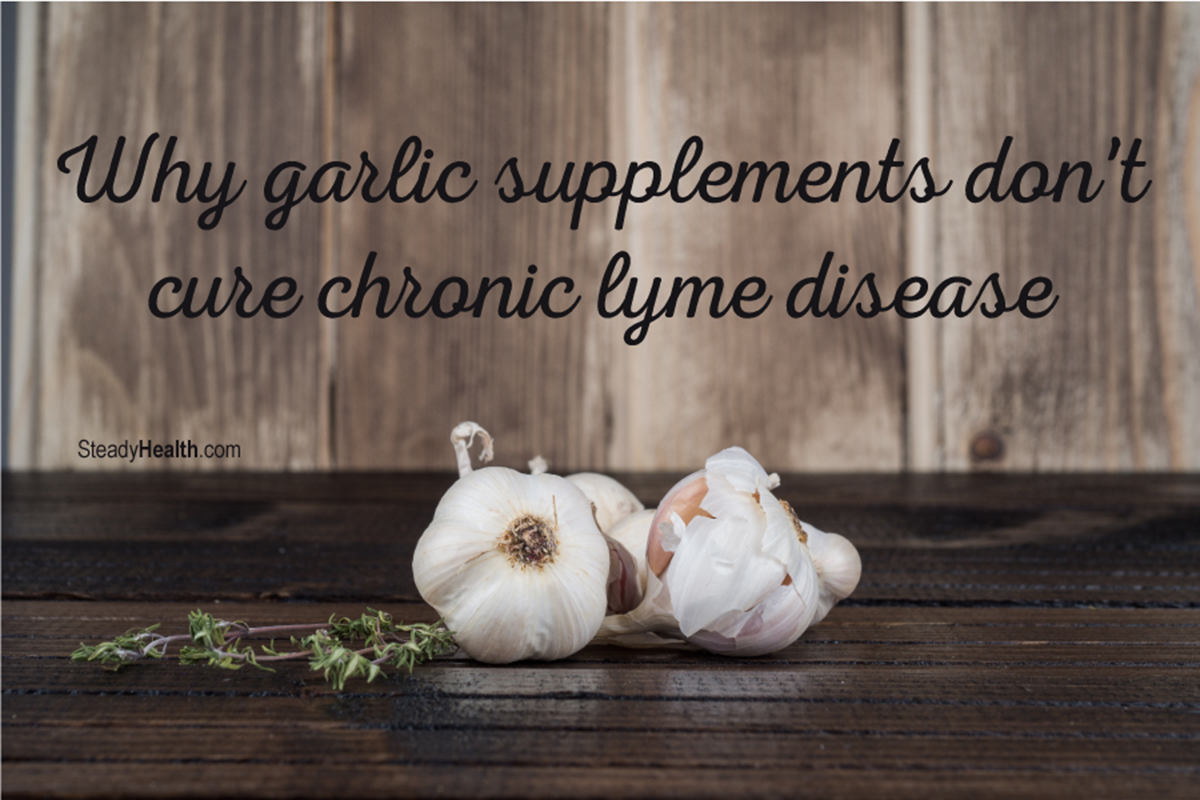Garlic is unquestionably your little flavor-filled friend. Used for its health benefits since at least 3000 BC, garlic possesses antimicrobial and cancer-fighting properties and is a powerful antioxidant. Regular garlic intake will reduce your risk of developing cardiovascular diseases, strengthens the immune system, and even helps prevent diabetes. [1] Garlic may also fight the common cold and lower your blood pressure and cholesterol levels [2].
What's not to like? All those things provide more than enough argument to find a prominent place for garlic in your diet — as if you needed a reason, right? Besides all the health benefits garlic may provide, it also, after all, provides a taste many people find pleasant.

Garlic And (Chronic) Lyme Disease: The Dubious Claims
Note: Quotes from non-scientific sources that do not deserve to be noted as references ahead. Links are, nonetheless, available from the links box below this article — hopefully for your amusement rather than as a source of supposed wisdom.
A site called "Tired of Lyme" tells us that:
"The active constituent in garlic is allicin, which possesses antibacterial, anti fungal, and anti parasitic properties. [...] Garlic also has the ability to oxidize heavy metals into a water soluble form. [...] Heavy metals can really damper the immune system, which is something a lot of Lyme literate doctors address during treatment."
The site likewise claims that garlic can cause a "Herx" — more about that later.
Another website, called "How to Cure", contains the following passage in a piece of writing about so-called natural "cures" for Lyme Disease:
"Garlic is used for curing a wide variety of diseases because of it medicinal properties. Garlic has anti-inflammatory, anti-viral, anti-fungal properties and antibiotic properties. Garlic mainly helps in reducing inflammation in your body caused due to lyme disease."
Not all alternative health proponents believe that garlic, whether in the form of supplements or diet, cures Lyme, however. One Stephen Buhner, who has apparently written books about natural cures for Lyme Disease, is on the saner end of the spectrum when he writes:
"...for lyme I do not think it a primary herb for treatment. It can be a useful adjunct in that regular garlic in the diet does help raise immune function. But as a direct antibacterial for lyme I think it useless. The primary reason is that lyme is exceptionally systemic and goes deep within a number of tissues. Therefore any herb to be used as an antibacterial must be able to penetrate to these difficult to reach areas."
Garlic Good, Expecting Garlic To Treat Lyme Disease Bad
So, let's take a closer look at some of those claims.
It is true that the allicin found in garlic has antimicrobial properties [3]. This is indeed the reason garlic has so many health benefits. Don't, however, expect garlic to treat a bacterial disease for which antibiotics (such as amoxicillin, doxycycline, and cefuroxime axetil) are the only proven treatment [4].
The reference to heavy metals in quoted above refers to a belief many proponents of alternative medicine seem to hold — that chronic Lyme Disease puts people at risk of developing symptomatic mercury poisoning. This is the reason you'll see chelation recommended as one of the numerous dangerous alternative therapies for chronic Lyme Disease. Don't fall for it; there's no evidence whatsoever that this works. [5]
Where discussion about chronic Lyme Disease and its (alternative) treatment gets really tricky, though, is the bit where the term could conceivably refer to at least three different situations:
- Untreated Lyme Disease that has progressed to its tertiary stage.
- So-called post-treatment Lyme Disease, in which a person who has already been treated for Lyme (with antibiotics!) is still experiencing a range of symptoms.
- A range of Lyme-like symptoms attributed to Lyme Disease in patients who have never displayed any evidence of a Borrelia burgdorferi infection. This is where we really wade into quack territory. People in this category undoubtedly experience symptoms with a very real cause in need of treatment, but if lab tests revealed that it wasn't Lyme, it just isn't. The fact is that 'chronic Lyme Disease" is not an actual diagnostic category. [6]
This is also where all the talk about "Herxing" after alternative treatment for chronic Lyme Disease gets really interesting. Short for a Jarisch-Herxheimer Reaction, "Herxing" is a very real response that can take place following antibiotic treatment for Lyme, as well as other conditions like syphilis. Its symptoms include fever, chills, low blood pressure, tachycardia, and muscle pain. [7] Alternative medicine proponents who use the term "Herxing", however, don't stick to the official symptom list and often attribute anything that makes the person feel worse to this phenomenon. The "Herx" has thus become a handy tool that "proves" the unscientific alternative treatment is working if one feels bad after using it.
In Conclusion
By all means eat garlic and even take garlic supplements. Garlic is good for you. It is not, however, going to cure untreated Lyme Disease, and it is also not going to solve the problems people with symptoms they have erroneously attributed to chronic Lyme Disease have. For real treatment, you'll still need a real doctor and a real diagnosis.


Your thoughts on this